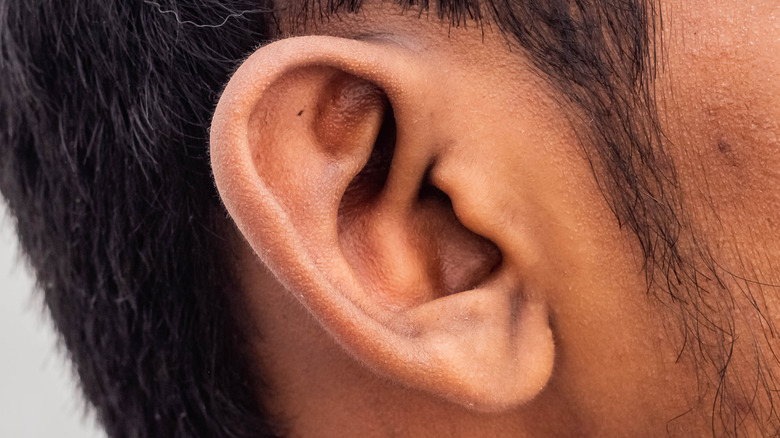This Is Likely The Last Sense You Lose When You Die
"We will all, someday, experience death, and become obsolete as a dead leaf falling from a tree, crushed by passers-by to ashes underlying the earth," wrote Kim Elizabeth, author of "Ten Thousand Sorrows" (via Sympathy Message Ideas). It's true that, as sure as we're born, the we'll all perish someday. We all process the reality of death in different ways. Some seek religious paradigms that promise a lavish afterlife of ease and reconcilement with those we grew to love here on earth. Some seek a heightened presence here in the moment and leave the existential questions about the beyond to others. In any case, there's no definitive way to ascertain what happens after we die, but what about that short window of time leading up to death?
Within the series of hours that precede death, and as our bodies shut down, respiratory functions falter, less oxygen is pumped into the brain, and we become more or less totally unresponsive. If you've ever been present during a loved one's final hours, you know first hand how difficult it can be to observe. However, seek comfort in knowing that a dying individual often experiences a sense of peacefulness and ease before they give up the ghost (per Health Direct). Also, if you need a few more moments to organize your final words to them, chances are you have more time to do so than you'd think.
Hearing could be the last sense you lose before you die
Experts believe that, as you approach the end of your physical and conscious journey, your ability to hear is likely the last thing to go. So if you really want to know what people thought of you during life, now's the time to listen up. In July of 2020, researchers performed a study involving hospice patients at St. John Hospice in Vancouver, Canada. Electroencephalography (EEG), a process that determines electrical activity within the brain, was used to observe the individuals before and after they became unresponsive. As the brain dies, it loses its grip on one's sense of taste, smell, sight, touch, and hearing — though the latter tends to hold out longer than the other four, according to Science Daily.
Before the patients slipped into an unconscious state, researchers briefed them on a process that involved different sounds and frequencies that would be communicated to them while they were comatose. They were invited to provide a specific signal when a certain deviation in the frequency or sound pattern arose. What they found was that, despite death being close on the horizon and all other bodily functions becoming dismantled, the brain was still able to clearly detect and distinguish the various noises and specific deviations in sound frequencies (per Scientific Reports). "Our data shows that a dying brain can respond to sound, even in an unconscious state, up to the last hours of life," said study lead author Elizabeth Blundon (via Science Daily).
The first things to go as you die
The process of dying is an elaborate one, and there's still much we don't know about it. The brain and body follow certain patterns of deterioration that allow for a softer, more linear departure from this world. Being that one's ability to detect and interpret sounds is likely the last sense to go in the process, it's nice to know that those you love can carry your final, tender remarks with them all the way up until the end. "It adds significant meaning to the last days and hours of life and shows that being present, in person or by phone, is meaningful," Dr. Romayne Gallagher of St. John Hospice shared following the study (per Science Daily). "It is a comfort to be able to say goodbye and express love."
It's also comforting to know that your senses don't vanish all at once, in the blink of an eye. While everyone's personal preference may be different, of course, the idea of a gradual easing into the unknown, and an incremental departure from life, might be more palatable for many.
But what about the first senses that get nixed? In a 2016 interview with The Atlantic, palliative care specialist James Hallenbeck outlined the preliminary stages of death as we can observe it gradually. It's hunger and thirst that are voided first and foremost, followed by speech, vision, and hearing. Whereas pain is often inevitable throughout the dying process, evidence shows that the that the closing hours of one's life are mostly humane and far less distressing upon the nerves than you'd think (via The Conversation).


